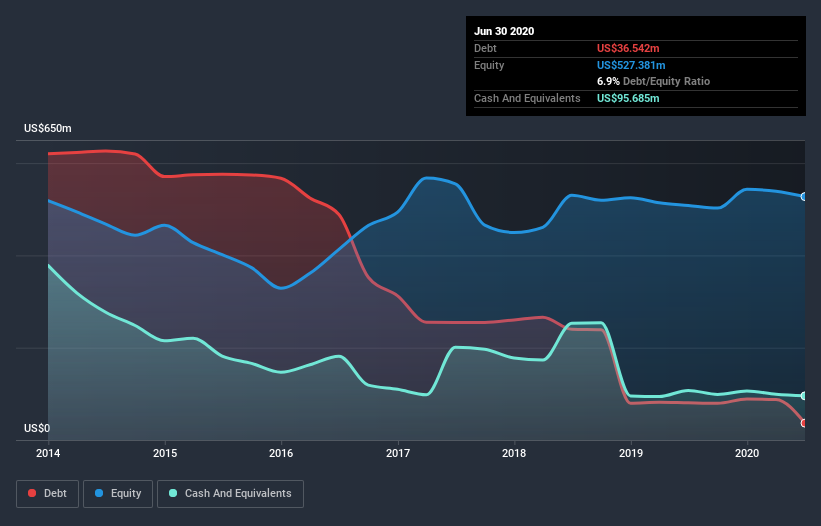Is Clean Energy Fuels (NASDAQ:CLNE) A Risky Investment?

Howard Marks put it nicely when he said that, rather than worrying about share price volatility, 'The possibility of permanent loss is the risk I worry about... and every practical investor I know worries about.' So it seems the smart money knows that debt - which is usually involved in bankruptcies - is a very important factor, when you assess how risky a company is. As with many other companies Clean Energy Fuels Corp. (NASDAQ:CLNE) makes use of debt. But the more important question is: how much risk is that debt creating?
What Risk Does Debt Bring?
Debt is a tool to help businesses grow, but if a business is incapable of paying off its lenders, then it exists at their mercy. Part and parcel of capitalism is the process of 'creative destruction' where failed businesses are mercilessly liquidated by their bankers. However, a more usual (but still expensive) situation is where a company must dilute shareholders at a cheap share price simply to get debt under control. Of course, debt can be an important tool in businesses, particularly capital heavy businesses. When we think about a company's use of debt, we first look at cash and debt together.
View our latest analysis for Clean Energy Fuels
What Is Clean Energy Fuels's Debt?
As you can see below, Clean Energy Fuels had US$36.5m of debt at June 2020, down from US$80.5m a year prior. But it also has US$95.7m in cash to offset that, meaning it has US$59.1m net cash.
A Look At Clean Energy Fuels's Liabilities
According to the last reported balance sheet, Clean Energy Fuels had liabilities of US$79.2m due within 12 months, and liabilities of US$62.5m due beyond 12 months. On the other hand, it had cash of US$95.7m and US$67.0m worth of receivables due within a year. So it can boast US$21.1m more liquid assets than total liabilities.
This surplus suggests that Clean Energy Fuels has a conservative balance sheet, and could probably eliminate its debt without much difficulty. Succinctly put, Clean Energy Fuels boasts net cash, so it's fair to say it does not have a heavy debt load!
Notably, Clean Energy Fuels made a loss at the EBIT level, last year, but improved that to positive EBIT of US$22m in the last twelve months. There's no doubt that we learn most about debt from the balance sheet. But ultimately the future profitability of the business will decide if Clean Energy Fuels can strengthen its balance sheet over time. So if you're focused on the future you can check out this free report showing analyst profit forecasts.
Finally, a company can only pay off debt with cold hard cash, not accounting profits. While Clean Energy Fuels has net cash on its balance sheet, it's still worth taking a look at its ability to convert earnings before interest and tax (EBIT) to free cash flow, to help us understand how quickly it is building (or eroding) that cash balance. Happily for any shareholders, Clean Energy Fuels actually produced more free cash flow than EBIT over the last year. There's nothing better than incoming cash when it comes to staying in your lenders' good graces.
Summing up
While it is always sensible to investigate a company's debt, in this case Clean Energy Fuels has US$59.1m in net cash and a decent-looking balance sheet. The cherry on top was that in converted 125% of that EBIT to free cash flow, bringing in US$28m. So is Clean Energy Fuels's debt a risk? It doesn't seem so to us. The balance sheet is clearly the area to focus on when you are analysing debt. However, not all investment risk resides within the balance sheet - far from it. Like risks, for instance. Every company has them, and we've spotted 2 warning signs for Clean Energy Fuels (of which 1 is potentially serious!) you should know about.
At the end of the day, it's often better to focus on companies that are free from net debt. You can access our special list of such companies (all with a track record of profit growth). It's free.
This article by Simply Wall St is general in nature. It does not constitute a recommendation to buy or sell any stock, and does not take account of your objectives, or your financial situation. We aim to bring you long-term focused analysis driven by fundamental data. Note that our analysis may not factor in the latest price-sensitive company announcements or qualitative material. Simply Wall St has no position in any stocks mentioned.
Have feedback on this article? Concerned about the content? Get in touch with us directly. Alternatively, email editorial-team@simplywallst.com.

